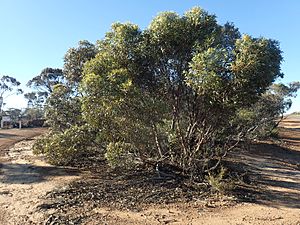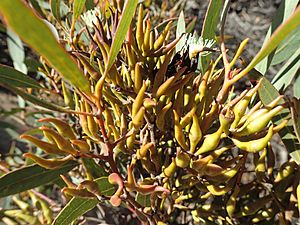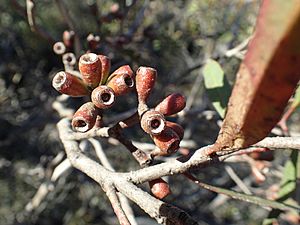Green mallet facts for kids
Quick facts for kids Green mallet |
|
|---|---|
 |
|
| Eucalyptus clivicola near Ravensthorpe | |
| Scientific classification |
|
| Kingdom: | Plantae |
| Clade: | Tracheophytes |
| Clade: | Angiosperms |
| Clade: | Eudicots |
| Clade: | Rosids |
| Order: | Myrtales |
| Family: | Myrtaceae |
| Genus: | Eucalyptus |
| Species: |
E. clivicola
|
| Binomial name | |
| Eucalyptus clivicola Brooker & Hopper
|
|
| Script error: The function "autoWithCaption" does not exist. | |
Script error: No such module "Check for conflicting parameters".
The Eucalyptus clivicola, often called the green mallet, is a special type of eucalypt tree. It grows only in Western Australia. This tree has smooth bark and long, narrow adult leaves. Its flowers are pale yellow, and its fruit looks like a small barrel or cone.
What it Looks Like
The green mallet is a type of mallet tree. This means it's a single-stemmed tree that doesn't usually grow new shoots from its base if it's damaged. It can grow up to 12 m (39 ft) tall.
Its bark is smooth and grey, with yellowish patches. Sometimes, you might see flakes of old, rough bark still clinging to the trunk.
The adult leaves are long and thin, like a spear. They are about 45–95 mm (1.8–3.7 in) long and 5–20 mm (0.20–0.79 in) wide. Each leaf has a small stem, called a petiole, about 5–15 mm (0.20–0.59 in) long.
The flower buds grow in small groups, usually with nine to thirteen buds together. These groups are on a main stalk, called a peduncle, which is about 7–20 mm (0.28–0.79 in) long. Each individual bud has its own tiny stem, called a pedicel, about 4–5 mm (0.16–0.20 in) long.
When the buds are ready to open, they are shaped like a top or are a bit longer. They are about 14–21 mm (0.55–0.83 in) long and 3–4 mm (0.12–0.16 in) wide. Each bud has a cap, called an operculum, which can be cone-shaped or look like a horn. This cap can be up to three times longer than the base of the bud.
Green mallet trees usually flower from December to May. Their flowers are a light yellow color.
After flowering, the tree produces fruit. These are woody capsules that hold the seeds. They are shaped like a barrel, cone, or cylinder and are about 6–10 mm (0.24–0.39 in) long and 5–6 mm (0.20–0.24 in) wide.
How it was Named
The Eucalyptus clivicola was officially described in 1991. Two scientists, Ian Brooker and Stephen Hopper, were the first to formally name it. They found a sample of the tree near the road between Ravensthorpe and Hopetoun. Their description was published in a science journal called Nuytsia.
The second part of its name, clivicola, comes from Latin words. Clivus means "hill" or "sloping hillside". The ending -cola means "dweller" or "one who lives in". So, clivicola means "hill dweller", which makes sense because this tree often grows on hills.
Where it Grows
The green mallet tree often grows in groups by itself, forming open forests on slopes or "breakaways" (steep edges of plateaus). It rarely grows on flat ground.
You can find this tree in Western Australia, in the area between Ongerup, Ravensthorpe, and Lake Magenta. These areas are part of the Esperance Plains and Mallee regions.
Conservation Status
The Western Australian Government's Department of Parks and Wildlife has classified this eucalypt as "not threatened". This means there are enough of these trees, and they are not currently at risk of disappearing.
 | Bayard Rustin |
 | Jeannette Carter |
 | Jeremiah A. Brown |



